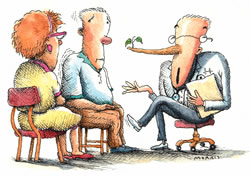
Jargon can be a valid and often time saving form of communication between professionals. It can also be a very
confusing form of communication to outsiders that do not understand the meanings behind the jargon, leading to misunderstandings and fear.
You probably think that medical professionals speak English. You are to a degree correct. Medical professionals
actually speak their own dialect of English and at times the dialect is incompressible to anyone outside of that profession.
Medical jargon is full of stylized dialect that it breeds confusion when professionals try to communicate with patients and
family members. For this reason, communication between medical professionals and "lay people" must be balanced. Professionals
must find out if what they are trying to say is understood. A professional must never assume that a patient has understood, they must
always ask if the patient has understood.
A patient must always speak up when something they have been told is not clear to them. Patients must question a term they do
not understand fully, such as being told their cancer is "metastasizing". This means that the cancer is spreading.
Jargon can also be used to help a professional cope with difficult patients and the rigors of their work. In the days when patients
did not have access to their own medical records, some slang recorded uncomplimentary or non-technical observations about them.
For example if the patient is difficult a professional may put the the letters "WNL" on their records. Other professionals on seeing
this will then know that the patient Will Not Listen; patient won't take medical advice. By using these and other forms of jargon professionals
can read a record and be aware of the problem without the patient hearing staff discuss them in an unflattering manner.
In hospitals, morbid humour forms of jargon can be a way of coping with the daily exposure to injury, disease and death. Euphemisms such as, "Eternal Care Unit", medical jargon for death, are a way of coping for the professionals , while not offending a patient that may overhear. Professionals cope with serious situations by seeking refuge in humour.



